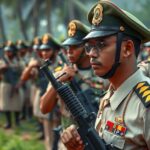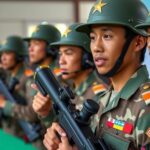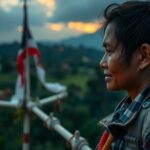Myanmar’s Rebels Face Challenge of Civil Administration Post-Liberation
Pro-democracy forces in Myanmar, especially in Karen State, have liberated territories from military rule and are now focused on establishing effective civil administrations. Figures such as Thaw Hti have shifted from military aspirations to educational roles, while leaders like Soe Khant implement local governance. Despite advances, challenges from the military persist, complicating efforts toward stability and governance in these areas.
In Myanmar, particularly in Karen State, pro-democracy forces have liberated territories from military control, but the next significant challenge is establishing civil administration in these areas. Following violent crackdowns on pro-democracy protests in 2021, many individuals, including Thaw Hti, sought refuge with ethnic armed groups like the Karen National Union (KNU).
Thaw Hti transitioned from viewing herself as a potential rebel soldier to becoming an educator, teaching displaced children while emphasizing Karen history and language. The KNU has been engaged in advocacy for the Karen people’s autonomy since the 1940s and now faces the task of administering newly acquired territories alongside providing public services.
Recent visits to liberated towns such as Kyaikdon reveal their potential for functioning communities, with local leaders like Soe Khant outlining development plans. He expressed a commitment to increasing essential services and a desire for eventual elections. Meanwhile, the military regime’s neglect has contributed to local support for KNU’s initiatives.
With former police officer Win Htun joining the KNU forces, there is a noticeable trend of educated professionals and former government workers contributing to civil administration. However, challenges persist as the military retains some control and continues to launch attacks, leading to an ongoing struggle for stability and governance in liberated areas.
The fight for democracy continues to evolve in Myanmar, with greater emphasis on the administration of newly liberated regions. Residents express a sense of progress but caution against overconfidence given the entrenched military presence. As they navigate this complex landscape, pro-democracy forces remain committed to advancing their objectives despite ongoing hardships.
Myanmar’s political landscape has been riddled with conflict following the military coup in 2021, which prompted widespread resistance from pro-democracy advocates. The Karen people, in particular, have a long history of striving for autonomy against the military regime, which is predominantly Bamar. With the ongoing civil war, newly liberated territories now require effective civil governance to sustain their gains against the military’s potential retaliation.
The situation in Myanmar’s liberated territories underscores the significant challenge of transitioning from military conflict to civil governance. As new leaders emerge and local communities seek to establish stable administrations, the ongoing resistance against the military will shape the future of democracy in the region. While progress has been made, the path ahead remains fraught with complexities and obstacles.
Original Source: www.aljazeera.com








Post Comment